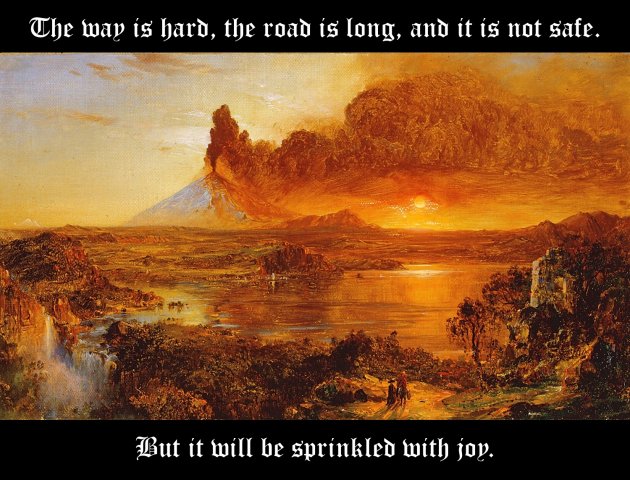Repeated emphasis on the importance of staying informed can easily trick you into thinking that endlessly consuming bad news on autopilot is a progressive moral duty, when in actuality it's the digital equivalent of emotional self-harm.
— Posted on Facebook by "Sara Z (@marysuewriter)," originally on Twitter, I think. I give credit where (as far as I can tell) credit is due, but a quick look at the original makes me not recommend it for reasons of language if nothing else. Nonetheless, this quote is spot on.
Permalink | Read 1320 times | Comments (1)
Category Inspiration: [first] [previous] [next] [newest]
What we didn't realize at the time, and I as a seminarian certainly didn't realize, was that by participating in the Liturgy, even if we didn't get it at first, even if we didn't want to be there at 9 a.m. on Sunday morning in our stalls, if we participated in the Liturgy it would profoundly change us.
Fr. Trey Garland, on being in choir with Dr. Robert Delcamp
Sunday November 17, 2019
American Guild of Organists Hymn Festival
Episcopal Church of the Resurrection, Longwood, Florida
Permalink | Read 1244 times | Comments (0)
Category Inspiration: [first] [previous] [next] [newest]
Permalink | Read 1153 times | Comments (0)
Category Inspiration: [first] [previous] [next] [newest]
I needed to hear this. The speech itself is about paying reparations for slavery, and it's a good one, but you can ignore that part. That's not the point of this post and I don't want it to turn into a discussion of that issue. Agree, seethe, fume, cheer, ignore—whatever you want. Just keep that part to yourself.
I've started the embedded video at about the 4:50 point, at Elder's description of what it was like for his father to be poor, black, illegitimate, and homeless at age 13—in Athens, Georgia at the start of the Depression.
It's good to be reminded once again that I could put a little more effort into the struggles I dare to call "work."
I've transcribed what that man had to say to his son:
I want you to follow the advice I've always given to you and your brothers. Hard work wins. You get out of life what you put into it. ... You cannot control the outcome, but you are 100% in control of the effort. And before you complain about what somebody did to you or said to you, go to the nearest mirror, look at it and say, "How could I have changed the outcome?" And finally, no matter how good you are, how moral you are, how ethical you are, bad things are going to happen. How you respond to those bad things will tell your mother and me whether or not we raised a man.
Permalink | Read 1396 times | Comments (2)
Category Inspiration: [first] [previous] [next] [newest]
It was written in 1992 and set in 1145, but the situation discussed in these excerpts from Ellis Peters' The Holy Thief—part of her Brother Cadfael series—sounds as fresh as this morning's dawn.
Robert Bossu This has become a war which cannot be won or lost. Victory and defeat have become alike impossible. Unfortunately it may take several years yet before most men begin to understand. We who are trying to ride two horses know it already.
Hugh Beringar If there is no winning and no losing, there has to be another way. No land can continue for ever in a chaotic stalemate between two exhausted forces.
Robert It has gone on too long, and it will go on some years yet, make no mistake. But there is no ending that way.
Hugh What does a sane man do while he's enduring such waiting as he can endure?
Robert Tills his own ground, shepherds his own flock, mends his own fences, and sharpens his own sword.
Hugh Collects his own revenues? And pays his own dues?
Robert Both. To the last penny. And keeps his own counsel. Even while terms like traitor and turncoat are being bandied about like arrows finding random marks.
Permalink | Read 1398 times | Comments (0)
Category Random Musings: [first] [previous] [next] [newest] Inspiration: [first] [previous] [next] [newest]
I've never liked William Golding's book, The Lord of the Flies. Why high school English teachers think it helpful to assault students' spirits with the distressing imaginations of disturbed minds, I cannot imagine. My daughter hated it even more than I did, and although she finished reading the book weeks before the school exam, she steadfastly refused to reread or study it in any way. She'd rather fail, she insisted. (Actually, she aced the test. Having a good memory is both a curse and a blessing.)
The Lord of the Flies certainly hit a chord with popular society, and like it or not has become part of our culture. Say to someone, "it's a Lord of the Flies situation there," and he knows exactly what you mean. It has also contributed to a good deal of negative and cynical thinking.
My sister-in-law, who knows my feelings on the matter, sent me this marvellous story about a real-life event that illustrates just the opposite about human behavior. (Warning: if you read the article, you may have to ignore some incidental, intense political ranting; I don't know what extras might be showing when you get there, but the last time I saw it I almost decided not to include the link. But credit must go where credit it due.) Here are some excerpts with the bare bones of the story:
This story [of the degradation and brutal behavior of castaway English schoolboys] never happened. An English schoolmaster, William Golding, made up this story in 1951—his novel Lord of the Flies would sell tens of millions of copies, be translated into more than 30 languages and hailed as one of the classics of the 20th century. In hindsight, the secret to the book’s success is clear. Golding had a masterful ability to portray the darkest depths of mankind. Of course, he had the zeitgeist of the 1960s on his side. (emphasis mine)
Years later when I began delving into the author’s life. I learned what an unhappy individual he had been: an alcoholic, prone to depression. “I have always understood the Nazis,” Golding confessed, “because I am of that sort by nature.” And it was “partly out of that sad self-knowledge” that he wrote Lord of the Flies.
I began to wonder: had anyone ever studied what real children would do if they found themselves alone on a deserted island? I wrote an article on the subject, in which I compared Lord of the Flies to modern scientific insights and concluded that, in all probability, kids would act very differently. Readers responded sceptically. All my examples concerned kids at home, at school, or at summer camp. Thus began my quest for a real-life Lord of the Flies. After trawling the web for a while, I came across an obscure blog that told an arresting story: “One day, in 1977, six boys set out from Tonga on a fishing trip ... Caught in a huge storm, the boys were shipwrecked on a deserted island. What do they do, this little tribe? They made a pact never to quarrel.”
It took some work to uncover the source of the story, as the date given was incorrect; the real year was 1966.
The real Lord of the Flies ... began in June 1965. The protagonists were six boys—Sione, Stephen, Kolo, David, Luke and Mano—all pupils at a strict Catholic boarding school in Nuku‘alofa [the capital of Tonga]. The oldest was 16, the youngest 13, and they had one main thing in common: they were bored witless. So they came up with a plan to escape: to Fiji, some 500 miles away, or even all the way to New Zealand.
The boys "borrowed" a small sailing boat, and their voyage started out fine, with fair skies and a mild breeze.
But that night the boys made a grave error. They fell asleep. A few hours later they awoke to water crashing down over their heads. It was dark. They hoisted the sail, which the wind promptly tore to shreds. Next to break was the rudder. “We drifted for eight days,” Mano told me. “Without food. Without water.” The boys tried catching fish. They managed to collect some rainwater in hollowed-out coconut shells and shared it equally between them, each taking a sip in the morning and another in the evening. Then, on the eighth day, they spied a miracle on the horizon. A small island, to be precise. Not a tropical paradise with waving palm trees and sandy beaches, but a hulking mass of rock, jutting up more than a thousand feet out of the ocean.
These days, the island is considered uninhabitable. But by the time the boys were rescued, 15 months later,
[They] had set up a small commune with food garden, hollowed-out tree trunks to store rainwater, a gymnasium with curious weights, a badminton court, chicken pens and a permanent fire, all from handiwork, an old knife blade and much determination.” While the boys in Lord of the Flies come to blows over the fire, those in this real-life version tended their flame so it never went out, for more than a year.
The kids agreed to work in teams of two, drawing up a strict roster for garden, kitchen and guard duty. Sometimes they quarrelled, but whenever that happened they solved it by imposing a time-out. Their days began and ended with song and prayer. Kolo fashioned a makeshift guitar from a piece of driftwood, half a coconut shell and six steel wires salvaged from their wrecked boat ... and played it to help lift their spirits. And their spirits needed lifting. All summer long it hardly rained, driving the boys frantic with thirst. They tried constructing a raft in order to leave the island, but it fell apart in the crashing surf.
Worst of all, Stephen slipped one day, fell off a cliff and broke his leg. The other boys picked their way down after him and then helped him back up to the top. They set his leg using sticks and leaves. “Don’t worry,” Sione joked. “We’ll do your work, while you lie there like King Taufa‘ahau Tupou himself!”
They survived initially on fish, coconuts, tame birds (they drank the blood as well as eating the meat); seabird eggs were sucked dry. Later, when they got to the top of the island, they found an ancient volcanic crater, where people had lived a century before. There the boys discovered wild taro, bananas and chickens (which had been reproducing for the 100 years since the last Tongans had left).
They were finally rescued on Sunday 11 September 1966. The local physician later expressed astonishment at their muscled physiques and Stephen’s perfectly healed leg.
The article has much more of the story, including how the rescued boys were immediately clapped into jail for having stolen the boat. (It ends well.)
This is a much better story than The Lord of the Flies, and it's true. Sadly, it's unlikely to have the social impact of Golding's book. But I hope all English teachers who insist on teaching Golding will be inspired to include the real story in their discussions. At the very least, parents now have an antidote to offer their distressed children.
And we all have an antidote to the evening news and social media.
During my lockdown-inspired nesting phase, I tacked the master bedroom closet first, and was thrilled to find two flags from my long-ago childhood. I calculate that they had survived at least six moves over four states: safe, albeit neglected, rolled up in a cardboard tube.
Many people have found this restricted time to be inspirational, and I am one of them. Finally, finally, my long-forsaken flags have been cleaned, mounted, and proudly displayed on our wall.
It turned out to be quite a project, especially trying to complete it with limited resources: this was during the severest phase of the lockdown, and I couldn't follow my usual practice of browsing frames at Jo-Ann's and Michael's until I found a size that inspired me. I did my browsing online instead, which was much less satisfactory. Nothing seemed right—certainly nothing that I could get handily.
I scoured the house for unused frames. I even considered temporarily cannibalizing a picture that had not yet found a home on our walls. But nothing was right.
So I reluctantly set aside the project and moved on. That was when I found, well-hidden in an obscure corner of our daughter's room, an unused poster frame. (Janet, if you were saving it for something, I owe you a frame.) It would be perfect, I thought, if only I had a 50-star flag to complete the set.
It was no easier to find the right flag than the right frame. They were either too big, too small, or too expensive. Finally, I looked away from all the flag stores and found one of the right size at Target. And it certainly wasn't too expensive: the price was $1.00. I placed my order.
Because of the pandemic-imposed restrictions, when Porter picked it up for me, he was unable to browse for the best quality—assuming there was one of better quality—but took what was handed to him. Somebody did a lousy job of print alignment. No matter; it does the job. Someday I may replace it with a better. Or not.
I'm proud to be one of the dwindling generation that has lived under three different American flags. Four, if you count the Bennington flag that was popular to fly during the Bicentenniel celebration of 1976.
Happy Flag Day to you all!
Permalink | Read 1486 times | Comments (0)
Category Hurricanes and Such: [first] [previous] [next] [newest] Everyday Life: [first] [previous] [next] [newest] Inspiration: [first] [previous] [next] [newest]
When the church finds itself in a time of great need, we typically break out the strongest thing we have in our arsenal, and that is the Great Litany. — Fr. Trey Garland
When writing about today's church service, I referenced the Great Litany from the Book of Common Prayer. Not finding anything online in a format I liked to link to, I've created my own here.
The Great Litany is better when sung, but powerful in any form. There's not much it doesn't cover.
O God the Father, Creator of heaven and earth,
Have mercy upon us.
O God the Son, Redeemer of the world,
Have mercy upon us.
O God the Holy Spirit, Sanctifier of the faithful,
Have mercy upon us.
O holy, blessed, and glorious Trinity, one God,
Have mercy upon us.
Remember not, Lord Christ, our offenses, nor the offenses
of our forefathers; neither reward us according to our sins.
Spare us, good Lord, spare thy people, whom thou hast
redeemed with thy most precious blood, and by thy mercy
preserve us, for ever.
Spare us, good Lord.
From all evil and wickedness; from sin; from the crafts
and assaults of the devil; and from everlasting damnation,
Good Lord, deliver us.
From all blindness of heart; from pride, vainglory,
and hypocrisy; from envy, hatred, and malice; and from all want
of charity,
Good Lord, deliver us.
From all inordinate and sinful affections; and from all the
deceits of the world, the flesh, and the devil,
Good Lord, deliver us.
From all false doctrine, heresy, and schism; from hardness
of heart, and contempt of thy Word and commandment,
Good Lord, deliver us.
From lightning and tempest; from earthquake, fire, and
flood; from plague, pestilence, and famine,
Good Lord, deliver us.
From all oppression, conspiracy, and rebellion; from
violence, battle, and murder; and from dying suddenly and
unprepared,
Good Lord, deliver us.
By the mystery of thy holy Incarnation; by thy holy Nativity
and submission to the Law; by thy Baptism, Fasting, and
Temptation,
Good Lord, deliver us.
By thine Agony and Bloody Sweat; by thy Cross and Passion;
by thy precious Death and Burial; by thy glorious Resurrection
and Ascension; and by the Coming of the Holy Ghost,
Good Lord, deliver us.
In all time of our tribulation; in all time of our prosperity; in
the hour of death, and in the day of judgment,
Good Lord, deliver us.
We sinners do beseech thee to hear us, O Lord God; and that
it may please thee to rule and govern thy holy Church
Universal in the right way,
We beesech thee to hear us, good Lord.
That it may please thee to illumine all bishops, priests, and
deacons, with true knowledge and understanding of thy
Word; and that both by their preaching and living, they may
set it forth, and show it accordingly,
We beseech thee to hear us, good Lord.
That it may please thee to bless and keep all thy people,
We beseech thee to hear us, good Lord.
That it may please thee to send forth laborers into thy
harvest, and to draw all mankind into thy kingdom,
We beseech thee to hear us, good Lord.
That it may please thee to give to all people increase of grace
to hear and receive thy Word, and to bring forth the fruits of
the Spirit,
We beseech thee to hear us, good Lord.
That it may please thee to bring into the way of truth all such
as have erred, and are deceived,
We beseech thee to hear us, good Lord.
That it may please thee to give us a heart to love and fear
thee, and diligently to live after thy commandments,
We beseech thee to hear us, good Lord.
That it may please thee so to rule the hearts of thy servants,
the President of the United States (or of this nation), and all
others in authority, that they may do justice, and love mercy,
and walk in the ways of truth,
We beseech thee to hear us, good Lord.
That it may please thee to make wars to cease in all the world;
to give to all nations unity, peace, and concord; and to
bestow freedom upon all peoples,
We beseech thee to hear us, good Lord.
That it may please thee to show thy pity upon all prisoners
and captives, the homeless and the hungry, and all who are
desolate and oppressed,
We beseech thee to hear us, good Lord.
That it may please thee to give and preserve to our use the
bountiful fruits of the earth, so that in due time all may enjoy
them,
We beseech thee to hear us, good Lord.
That it may please thee to inspire us, in our several callings,
to do the work which thou givest us to do with singleness of
heart as thy servants, and for the common good,
We beseech thee to hear us, good Lord.
That it may please thee to preserve all who are in danger by
reason of their labor or their travel,
We beseech thee to hear us, good Lord.
That it may please thee to preserve, and provide for, all
women in childbirth, young children and orphans, the
widowed, and all whose homes are broken or torn by strife,
We beseech thee to hear us, good Lord.
That it may please thee to visit the lonely; to strengthen all
who suffer in mind, body, and spirit; and to comfort with thy
presence those who are failing and infirm,
We beseech thee to hear us, good Lord.
That it may please thee to support, help, and comfort all who
are in danger, necessity, and tribulation,
We beseech thee to hear us, good Lord.
That it may please thee to have mercy upon all mankind,
We beseech thee to hear us, good Lord.
That it may please thee to give us true repentance; to forgive
us all our sins, negligences, and ignorances; and to endue
us with the grace of thy Holy Spirit to amend our lives
according to thy holy Word,
We beseech thee to hear us, good Lord.
That it may please thee to forgive our enemies, persecutors,
and slanderers, and to turn their hearts,
We beseech thee to hear us, good Lord.
That it may please thee to strengthen such as do stand; to
comfort and help the weak-hearted; to raise up those who
fall; and finally to beat down Satan under our feet,
We beseech thee to hear us, good Lord.
That it may please thee to grant to all the faithful departed
eternal life and peace,
We beseech thee to hear us, good Lord.
That it may please thee to grant that, in the fellowship of
all the saints, we may attain to thy
heavenly kingdom,
We beseech thee to hear us, good Lord.
Son of God, we beseech thee to hear us.
Son of God, we beseech thee to hear us.
O Lamb of God, that takest away the sins of the world,
Have mercy upon us.
O Lamb of God, that takest away the sins of the world,
Have mercy upon us.
O Lamb of God, that takest away the sins of the world,
Grant us thy peace.
O Christ, hear us.
O Christ, hear us.
Lord, have mercy upon us.
Christ, have mercy upon us.
Lord, have mercy upon us.
Permalink | Read 1182 times | Comments (0)
Category Inspiration: [first] [previous] [next] [newest]
(Posted by a grieving young woman dear to my heart, who gave me permission to share.)
Permalink | Read 1405 times | Comments (0)
Category Inspiration: [first] [previous] [next] [newest]
Permalink | Read 1153 times | Comments (0)
Category Inspiration: [first] [previous] [next] [newest]
Nothing is more pleasing and engaging than the sense of having conferred benefits. Not even the gratification of receiving them.
— Brother Cadfael
(Ellis Peters, The Hermit of Eyton Forest)
Permalink | Read 1265 times | Comments (0)
Category Inspiration: [first] [previous] [next] [newest]
Mortal man should be able and willing to delegate at any moment, since mortal he is.
— Brother Cadfael
(Ellis Peters, Dead Man's Ransom)
Permalink | Read 1410 times | Comments (0)
Category Inspiration: [first] [previous] [next] [newest]
It's been a while since I posted in my Conservationist Living category, which is this post's primary classification, though I've assigned it to several others as well.
America is going to hell, right? Everybody says so. Including a whole lot of people who fervently believe there is no such place as hell, which is an interesting conundrum. But they all believe with equal fervor that we are going there rapidly. Believer or non-believer, left-wing or right-wing, we are convinced that we're in bad shape and on course to get much, much worse. What we disagree on is the attitudes, events, actions, and pathways that are taking us hell-ward.
Believe me, I'm not immune to such pessimism. Neither are you, so I'm going to tell you a small part of the story of Dave Anderson.
The Andersons are friends of our daughter's family, from their Pittsburgh days. Dave's success at building a good life for his family while reclaiming a worn-out strip mine and putting to good use many hundreds of tons of refuse every year was featured last month in this Pittsburgh Post-Gazette article.
I made the 45-minute drive to Echo Valley Farm this week because I wanted to meet the man who’d turned strip-mined land in northwest Beaver County into 26 grassy acres on which beef cattle thrive. Mr. Anderson had told me he revived his land by mixing hundreds of thousands of used paper cups from the Pittsburgh Marathon with manure, hay, banana peels and restaurant refuse.
You'll want to read the whole article to learn about the symbiotic relationship between the farm, needing nourisment, and both private businesses and local governments, needing waste disposal, that's a win for everyone involved.
It all works because there’s something in it for everyone. Mr. Anderson said that 14 years ago, the field over my shoulder produced 6,000 pounds of hay at the first cutting. The cutting in [the] same field last year brought 37,000 pounds.
Plus, the farm is a great place to raise kids.
I ask if it’s just the two of them and he says, no, he and his wife, Elaine, have six girls and a boy. They range in age from 10 to 24. All seven of them comprise Echo Valley, a bluegrass/gospel/Celtic band, that just played in Harrodsburg, Ky., Saturday night.
Several years ago—it was probably more than ten, though I'm finding that hard to believe—we visited the budding farm for one of their many social gatherings of food, music, and fun. Kids and animals were everywhere. The children were much younger then, of course, but they were already solid musicians. Here is a more recent video of the group.
and one of my favorites from earlier, just for fun.
Mr. Anderson, an inveterate reader who doesn’t own a TV, and who also was an air traffic manager until he retired last Friday, figured out how to turn desolate land into a lush farm that supports a family of nine with 30 head of beef cattle, six miniature donkeys, 40 laying hens, two turkeys, four guinea fowl, three geese, three ducks, two Australian cattle dogs and six pups.
Not to mention a number of cats, as I recall.
I hope this brightened your day. If America is, indeed, going to hell, people like the Andersons are pulling mightily in the other direction.
Permalink | Read 1688 times | Comments (4)
Category Politics: [first] [previous] [next] [newest] Children & Family Issues: [first] [previous] [next] [newest] Food: [first] [previous] [next] [newest] Conservationist Living: [first] [previous] [next] [newest] Inspiration: [first] [previous] [next] [newest]
Permalink | Read 1507 times | Comments (1)
Category Inspiration: [first] [previous] [next] [newest]
Words of wisdom for our time from one of my favorite columnists, "back in the day"—economist Milton Friedman:
One of the great mistakes is to judge policies and programs by their intentions rather than their results.
Permalink | Read 1063 times | Comments (0)
Category Inspiration: [first] [previous] [next] [newest]







